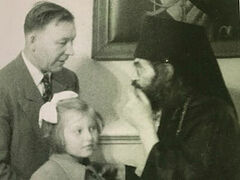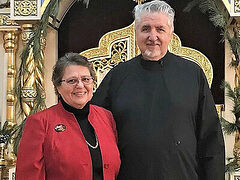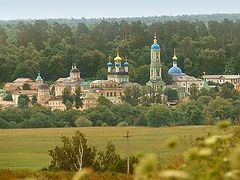 Bishop Nektary and Hieromonk Seraphim (Rose)
Bishop Nektary and Hieromonk Seraphim (Rose)
Maria Kotar is the wife of Archpriest Serge Kotar, who has served for many years in the Joy of All Who Sorrow Cathedral in San Francisco, with the relics of St. John of Shanghai and San Francisco. Maria has known St. John and many other elders and ascetics of piety of the Russian Orthodox Church Outside of Russia from childhood.
They didn’t consider themselves elders, but they were
I’ve already talked about how my family was pastored by St. John in both Shanghai and San Francisco. I’ll talk separately about how Hieromonk Seraphim (Rose) became my spiritual father.
For now, I would like to talk about other holy people I grew up with. This includes Vladyka Nektary (Kontzevitch), who was guided by Elder Nektary of Optina and brought the Optina spirit to us, and Vladyka Anthony (Medvedev), and Vladyka Philaret (Voznesensky), whose body is incorrupt…
They were holy people and true elders. Of course, they didn’t consider themselves elders, but they were. Their holiness consisted in that, besides other spiritual gifts, they were very meek and humble. They were also very sober people—no hysterics, no frightful visions, nothing wild—the royal path, strictness with themselves, and mercy and love for others.
The first ROCOR elder whom I’d like to talk about is Bishop Nektary (Kontzevitch), but my story won’t be just about him, but also about those whom he loved and revered.
Vladyka Nektary (Kontzevitch) (1905-1983)
I didn’t have a grandfather because he died early, and I considered Vladyka Nektary my grandfather in my childhood. We were living in Seattle then, and he was the bishop of Seattle, the vicar of the Western American Diocese. In those days, my mother was the elder sister at the Seattle parish (our ROCOR parishes usually have a sisterhood that organizes common meals for all parishioners after the services and helps clean the church and get it ready for feasts, so they have a lot of things to take care of).
Vladyka Nektary lived next to the church, and my mother always tried to take care of him and his sister Vera. He had hypertension and heart disease, and my mother liked to treat him with various natural remedies. She always took care of Vladyka’s health, tried to support him, and provided him with various medicines.
The Optina spirit
In turn, Vladyka really loved our family, and would come visit us both in Seattle, and in San Francisco when we moved there. When he visited us, he would always tell us about Optina and about Russia. This spirit of his stories—the real Orthodox spirit—was transmitted to us.
Vladyka was born in 1905 and managed to visit old Optina with its elders and the succession of the Optina spirit.
Vanya, Volodya, and Oleg Kontzevitch
It was 1922 when the future Bishop Nektary, then a seventeen-year-old named Oleg, went to Optina with his mother, Alexandra Ivanovna Kontzevitch, a spiritual child of Elder Nektary of Optina.
The Kontzevitch family had three brothers. The eldest, Ivan, was born in 1983, the middle son, Vladimir, was born in 1895, and the youngest, Oleg, was born in 1905. There was also a sister, Vera.
Everyone’s favorite, Volodya, was smart, kind, and talented. He volunteered to go to the front at a very young age and died on the fields of WWI in Austria. He had a sacrificial death: They had to cut some barbed wire under enemy fire, and they all drew lots for who would go to their certain death. Volodya didn’t draw the lot, but he replaced another soldier and was killed.
Having lost Volodya, in 1922, Alexandra and Oleg knew nothing about the fate of the elder son, Vanya. Vanya had already been to Optina and got spiritual guidance from the elders, and he fought in the ranks of the Volunteer Army in the Civil War. The war was already over, but his family had no news about him.
“And Vanya?”
Oleg would later write in a letter to his older brother:
In 1922, when mama and I went to Optina for the first time, Elder Anatoly was still alive. We still had no news about you then, and mama asked Fr. Anatoly how to pray for you—as for the living or the reposed?
Fr. Anatoly asked her whether she’d ever seen you in a dream. She answered that she had seen her sons riding horses in a dream—first the reposed Volodya, and then you. But the horses were of different colors. Fr. Anatoly said:
“Well, God is merciful! So pray for his health. God is merciful.”
After visiting Fr. Anatoly, we visited Fr. Nektary. Mama asked the Elder a number of questions about Vera, about herself, about me, but nothing about you, because she knows you shouldn’t ask two elders about the same issue. I didn’t know this, and assuming that mama forgot to ask about you, I was tugging at her the whole time, and I said to her:
“And Vanya? And Vanya?”
Mama kept not asking. Then, after I asked again, Batiushka said to her:
“He’s alive. Pray for his health. You’ll get news about him soon. It wasn’t useful for you to know about him.”
“We went fifty miles on foot, but Grandpa comforted us the whole time”
In 1923, the Optina Elder Nektary was sent into exile, forbidden to live in the Kaluga Province. After wandering for a while, he found shelter in the village of Kholmischi in the Bryansk Province, and then his loyal and loving spiritual children came to him there. And Oleg and his mother went to see him.
It was a very difficult dirt road. In the spring and fall, it was muddy, and when the river overflowed, you had to bypass it past the forest, full of wild animals. Wolves would often come out on the road.
Alexandra recalled these trips to the Elder (for the sake of secrecy, all his spiritual children started calling him “Grandpa” in their letters):
We got back yesterday from visiting Grandpa. Today is Palm Sunday. Spring is in full swing: It’s warm, the trees are turning green, the sun is shining. The trip to see Grandpa was very difficult. Because of the flooding of the rivers, we couldn’t get there on horseback, and we had to go fifty miles on foot (bypassing). We walked in water up to our knees, we waded through thick mud, and slid across frozen hillocks. There was a good road in some places, but in general, we were so tired that by the end of the journey, having gone a mile, we had to lay down to rest.
But Grandpa comforted us the whole time. There was no one there besides us. We spent a day and a half with him.
“The wolf politely gave way to us”
She also wrote:
There are many more wolves here now. They’ve killed all the cattle at several farms. When Oleg and I were going to see Grandpa, we also came across a wolf on the path in the forest. He was sitting on the path we were on, but then he politely gave way to us, crossed to the edge of the forest, then sat down again behind us in the same place.
It was getting dark. Oleg was a little scared: We didn’t even have a stick, but I didn’t feel the slightest fear, in the hope of Grandpa’s prayers.
“Here’s your medicine”
In the mid-1920s, Oleg was a young student in the mechanical department of the Transport Institute, but to his mother, he was still “Olezhek.” And in his recollections, he would call her “my unforgettable mamochka,” even many years later, when he was already a gray-haired bishop.
Alexandra wrote about the next visit to Elder Nektary:
When we arrived, Olezhek was sick. He had a 104° fever. I told Batiushka: “Olezhek is sick,” and he said, smiling: “It’s good to get sick in good health.”
The next day, he gave me an apple and said: “Here’s your medicine.” And as he blessed us to go on our way, he said: “When you feed the horses, let Oleg drink some hot water, and he’ll get better.” That’s what we did. Olezhek drank the hot water, and then he fell asleep, and woke up saying: “Mamochka! I’m well!”
The blessings of Elder Nektary of Optina
Elder Nektary continued to minister to his spiritual children in exile. In the case of the Kontzevitches, he did this in correspondence with the mother, Alexandra. She testified about the blessings of their spiritual father for herself and her sons:
He blessed Olezhek to take care of his salary, and we can say he received it in a miraculous way—not just for this year, but for the entire preceding year, without any patronage, while last year they had refused to pay him. Olezhek was also blessed to have good studies—and so far he’s been doing quite well in all subjects related to his degree.
Grandpa blessed me to hold lessons, and six students have asked me to help them, and they were all choice students—smart, capable, and believers!
Ah, how sad that we live so far from Grandpa and can only rarely resort to his blessing.
“Prayer is capital: The more you invest, the more interest you get”
Alexandra also recalled how Elder Nektary comforted those who thought the Lord wasn’t hearing their prayers:
Grandpa said it’s really good if the Lord doesn’t hear your prayers for a long time. You just have to keep praying and not despair: “Prayer is capital—the more capital you invest, the more interest you get. The Lord sends His mercy when it pleases Him—when it’s useful for us to receive it.
If we really need something, then we should pray about it two or three times, and then we have to thank God for fulfilling our request.
Sometimes the Lord fulfills our request after a year. We should take an example from Sts. Joachim and Anna. They prayed their whole lives without falling into despair, but only hoped, and what consolation the Lord sent them!
The advice of Elder Nektary of Optina
Alexandra also wrote about Elder Nektary:
“He achieved the highest gifts of grace, but knows how to hide them so that even those around him have no idea about them, and sometimes they try to deceive him, but he doesn’t let on that he understands everything.”
She also writes:
Grandpa once said from himself: “Pray physically—the Lord God will send His grace to help you.” This means to pray with bows from the waist, and when necessary, with prostrations. Grandpa even stood in front of the icons, slowly made the Sign of the Cross, and bowed low, touching his right hand to the ground, and said to me: “Pray like this.”
Pray for the Lord to reign in your heart—then it will be filled with great exultation and joy, and no sorrow will be able to disturb it. To this end, Grandpa advised me to pray like this: “Lord, open the doors of Thy mercy.”
Elder Nektary was the Kontzevitches’ spiritual father until his death
After he had already become a bishop, Vladyka Nektary wrote:
“With tender filial love, I remember the unforgettable, spirit-bearing, clairvoyant Optina elder Hieromonk Nektary, who has long since departed to God, to whose stole my unforgettable, beloved mother led me in my youth.”
Elder Nektary foretold monasticism for Oleg and his mother, the widow Alexandra. Both would be tonsured in monasticism with the names Nektary and Nektaria, in memory of their spiritual father.
Elder Nektary was the spiritual father for the Kontzevitch family until his blessed repose in 1928.











